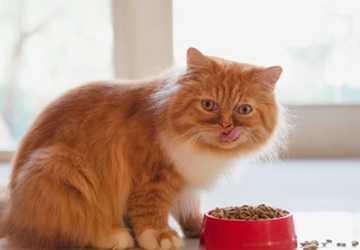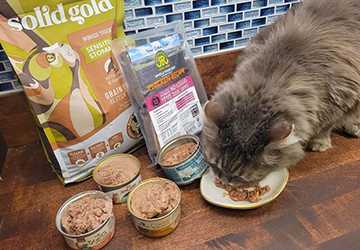The Best Foods to Help Manage Your Cat’s Weight
Being overweight is a significant cat problem relevant to most cat owners worldwide. It can present various health risks that affect the cat's well-being and life span.
Obesity damages the cat's joints and results in arthritis and limited movement. Obesity also predisposes one to diabetes, which is a severe illness, and one has to spend their entire life under supervision.

Further, being overweight can reduce a cat's well-being and decrease its capacity for activities inherent to felines, such as playing and investigating. This impacts not only their body but also their mind. There are ways to tackle the issue of obesity in your cat effectively.
In this article, we'll explore the list of foods that will help your kitty stay slim and healthy in the current article. Food choices for the cat can easily enable the cat to be at the ideal body weight.
Read on to learn more about the secrets to keeping your cat healthy and happy for many more years.
Why is Managing Your Cat's Weight Important?
Controlling your cat's fat content is essential for its well-being and satisfaction. Thus, monitoring your body condition and maintaining a desirable weight can contribute to the prevention of numerous diseases and health conditions.
Obesity in cats is known to cause diabetes, joint issues, and even heart disease. These are diseases that lower your cat's quality of life, and at the same time, they are expensive to treat.
On the other hand, a cat with an average body condition is usually a more active animal than an overweight cat. They are better positioned to play, have fun, and even enjoy the regular or daily tasks they go through.
Proper foods are essential when it comes to managing body weight. Commercially available high-quality cat foods are well-balanced in nutrients and help control the calorie level required for the cat.
As long as you pay attention to the type and amount of food your cat consumes, you can avoid obesity, which enhances overall health and contributes to a longer and happier life.
3 Best Foods to Help Manage Your Cat's Weight
Having discussed managing your cat's weight, it is time to look at the types of foods to feed your cat. These food products are meant to be nutritious and assist in managing body weight.
1. High Protein, Low Carbs
For weight loss, it is advised to eat high-protein and low-carbohydrate foods. These foods aid in the retention of muscle mass and the loss of unnecessary fat deposits.
When choosing cat foods, select those that contain real meat as the first diet ingredient; it may be chicken, turkey, or fish. These foods are complete sources of proteins and supply amino acids that are important for your cat's health.
Some top choices in this category include:
● The proposed Brand X's Grain-Free Chicken Formula
● In the Brand Y Food Product, the Pet Food Turkey Recipe High in Protein
● Low-carb salmon dinner from brand Z
Understanding that high-protein and low-carb foods are more satiety is also essential. This means that the cat will be complete for a more extended period. This can help the cat avoid taking large portions of food and gaining unwanted pounds.
2. Fiber-Rich Formula
Fibre is another nutrient that has to be incorporated into the weight management diet plan. It assists in encouraging the sensation of satiety and plays a role in digestion.

Search for cat foods containing quality fibre, such as peas, lentils, or beet pulp. These ingredients offer soluble and insoluble fibre that benefits your cat's digestive system.
Some excellent fibre-rich options include:
● Indoor Cat Formula with Added Fiber of the Brand A
● To understand the detailed aspects of this choice, Brand B's weight control recipe is peas and lentils.
● High-Fiber Hairball Control Diet of Brand C
Fibre also helps stabilize blood sugar levels, which is very useful for cats that are diabetic or have a tendency to develop diabetes.
3. Vet-Recommended Diet
A special veterinary diet is sometimes necessary to successfully manage a cat's weight. These foods, developed with the help of veterinary nutritionists, are low in calories and contain certain nutrients.
Some of the following aspects are common in diets recommended by veterinarians: protein sources, fibre content, and vitamins and minerals. They can also contain special weight-loss additives, such as L carnitine or conjugated linoleic acid (CLA).
Some popular vet-recommended diets for weight management include:
● Prescription Weight Loss Formula of Brand X
● Metabolic Diet of Brand Y for Obesity Control
● Satiety Support Veterinary Diet of Brand Z
Discuss the most appropriate diet with the veterinarian if you have a severely overweight cat or a cat with other health problems. They know the vet-exclusive formula that will best suit your cat, depending on their needs.
Act Now for a Healthier, Happier Cat!
By selecting the right foods for weight management for your cat, you will provide them with a healthy and happy life. Start today and feel and see the difference for yourself.
This blog post contains the latest pet care tips and product recommendations. So, why are you waiting? Start feeding your cat the right foods and manage its weight. You've got this!
Frequently Asked Questions
Q. How often should I feed my overweight cat?
Ans. Split your cat's daily ration into portions that you feed at different intervals to increase the cat's metabolism and help the cat lose weight.
Q. What ingredients should I look for in weight management cat food?
Ans. Opt for foods containing high-quality proteins, low carbohydrates, and fibre to ensure your cat feels full.
Q. Can I give treats to my overweight cat?
Ans. Yes, but ensure the foods are low in calories and that only a little is given to prevent too many calories from being taken in.
Q. How long does it take to see results in my cat's weight?
Ans. It does take some time for the effects to be seen, but you may see your cat lose some weight and gain more energy in as little as two weeks of feeding portioned amounts of the food.





